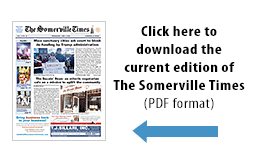(The opinions and views expressed in the commentaries of The Somerville Times belong solely to the authors of those commentaries and do not reflect the views or opinions of The Somerville Times, its staff or publishers)
On behalf of Union United – a multi-issue coalition of community stakeholders, including small business owners, residents, activists, immigrant groups, religious congregations, labor unions, and community-based organizations – we are writing to express our views on the Union Square redevelopment process and project. As we talk to neighbors, we hear harrowing stories of rising rents, business and resident displacement, and calls for greater inclusion and transparency in the planning process. We recognize the value of strengthening the city’s commercial tax base and we want to ensure that Union Square’s unique social fabric is protected. In order to meet that goal, it is essential that affordability, workers’ rights, and public safety are also prioritized as new development and infrastructure investments occur. This is an important opportunity for an entire community to shape its built environment on the basis of inclusion, equity, and future prosperity for all residents.
Union United is focused on intentional and influential community decision-making, as reflected in the city’s Somerville’s goals, which call for “engaging community members in civic life and decision-making, seeking diverse representation and participation” by “encouraging volunteer neighborhood-level participation” and “implementing more collaborative processes for engaging neighbors in review of development projects” (page 33 and 34). While we applaud the creation of the Civic Advisory Committee and the transparent public process convened by that committee, not all Union Square stakeholders are adequately represented in the CAC. We strongly believe that those who are not represented on the CAC should be able to help shape and determine priorities, as their lives and livelihoods will be greatly impacted by the redevelopment process and its outcome. To that end, we formed Union United in April 2014, an inclusive coalition that is growing by the day. We have had productive meetings with prospective developers shortlisted for the project to share our vision and hope to have the same opportunity with others.
As a coalition committed to equitable growth, we want decision-makers to ensure that equity is part of the selection criteria for the master developer, that Union United’s issues are included in any and all forms of a master or land disposition agreement between the city and the master developer, and that the master developer be willing to negotiate and sign a community benefits agreement (CBA) with Union United as part of its agreement with the city.
As a first step, we want to advocate for the Link Somerville Equity Standards. Comprised of community members representing various groups, Link Somerville has engaged over 1,000 people to create and prioritize community principles for the Green Line Corridor through the Community Corridor Planning Initiative. Recently, Link Somerville released a draft working document called the “Link Somerville Equity Standards” – a set of community-generated metrics for equitable development in Somerville with respect to new growth. We define equity as just-and-fair inclusion that creates conditions in which all can reach their full potential to participate and prosper, borrowing from the national action institute PolicyLink. Union United believes the Link Somerville Equity Standards should serve as an equity framework in developing formal criteria and land use mixes with public input. This includes, but is not limited to, the following:
• Jobs Equity Goal: New jobs in Somerville for Somerville residents
• Business Equity Goal: Maintain and promote local businesses
• Housing Equity Goal: A large percentage of new housing units should be permanently affordable for low- and moderate-income households
• Green Space Equity Goal: New acreage of accessible open, green, and growing space in environmental justice (EJ) neighborhoods
• Transportation Equity Goal: Improve and increase mobility options in transforming areas as identified in SomerVision’s Transportation Goals
• Land Use Equity Goal: Community decision-making for disposition properties
We understand that the Union Square Request for Qualifications (RFQ), the Union Square Revitalization Plan, and subsequent developer proposals are largely qualitative documents and were not intended to specifically include clear provisions for ensuring local jobs, affordable housing, active open space, guarantees for longstanding businesses, and other equitable outcomes. The city of Somerville requested $2.5 million from the Board of Aldermen for private property acquisition within the D-1 Block as part of its Fiscal Year 2014 Capital Improvements Plan. We anticipate more tax dollars being committed to this project over the next two decades. Given this, we strongly believe that if public dollars are being employed for this transformative urban renewal project, then our community should receive substantial public benefits from it.
We look forward to playing an active role in the redevelopment process and helping to create a Union Square that is diverse, sustainable, and equitable.
For more information about the coalition, contact Mashael Majid at mmajid@somervillecdc.org.
— Union United Coalition















Reader Comments